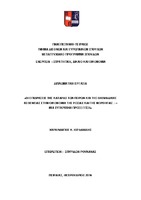Οι επιδράσεις της κατάρας των πόρων και της ολλανδικής ασθένειας στην οικονομία της Ρωσίας και της Νορβηγίας : μια συγκριτική προσέγγιση

Προβολή/
Λέξεις κλειδιά
Φυσικοί πόροι ; Κατάρα των πόρων ; Ολλανδική ασθένεια ; Διεθνής πολιτική οικονομία ; Ρωσία ; Νορβηγία ; Οικονομική μεγέθυνση ; Πλούτος ; Φτώχεια ; Βιοτικό επίπεδο ; Μακροοικονομικά μεγέθη ; Natural resources ; Resource curse ; Dutch disease ; International political economy ; Norway ; Russia ; Economic growth ; Wealth ; Poverty ; Standard of living ; Macroeconomic fundamentalsΠερίληψη
Σε πολλές χώρες, οι φυσικοί πόροι δεν έχουν πάντα θετική επίδραση στην οικονομική μεγέθυνση και την βελτίωση του βιοτικού επιπέδου των κατοίκων τους. Η βιβλιογραφία σχετικά με την «κατάρα των πόρων» παρουσιάζει μια ζοφερή σχέση: οι χώρες με μεγάλα αποθέματα φυσικών πόρων βιώνουν γενικά χαμηλότερη οικονομική μεγέθυνση σε σχέση με άλλες χώρες. Ωστόσο η κατοχή φυσικών πόρων μπορεί να είναι είτε ευλογία είτε κατάρα για μια χώρα, ανάλογα με τον τρόπο που θα υλοποιηθεί η εκμετάλλευση τους καθώς και το γενικότερο οικονομικό, κοινωνικό και πολιτικό περιβάλλον που θα διαμορφωθεί. Συχνά η κατοχή και διαχείριση φυσικών πόρων συνδέεται με αυξημένα επίπεδα διαφθοράς, έλλειψη δημοκρατικών θεσμών, χαμηλούς ρυθμούς οικονομικής ανάπτυξης.
Στην συγκεκριμένη εργασία πραγματοποιείται μια μελέτη για την ύπαρξη ή μη της κατάρας των πόρων και της ολλανδικής ασθένειας υπό το πρίσμα της Διεθνούς Πολιτικής Οικονομίας σε δυο τελείως διαφορετικές περιπτώσεις, της ρωσικής οικονομίας και της νορβηγικής οικονομίας. Μελετώνται τα βασικά μακροοικονομικά οικονομικά μεγέθη των δύο χωρών, η διαχείριση των πόρων και των εσόδων που προέρχονται από αυτούς καθώς και οι επιπτώσεις που προκαλούν οι αλλαγές των τιμών του πετρελαίου και ειδικότερα οι μειώσεις.
Σε συνέχεια της μελέτης και της έρευνας διατυπώνονται συμπεράσματα για την επίδραση της κατάρας των πόρων σε κάθε μία οικονομία, εντοπίζονται τα κοινά τους στοιχεία και επισημαίνονται οι διαφορές που υπάρχουν στα δυο οικονομικά μοντέλα. Τέλος παρουσιάζονται προτάσεις αντιμετώπισης των αρνητικών συνεπειών της κατοχής φυσικών πόρων.


